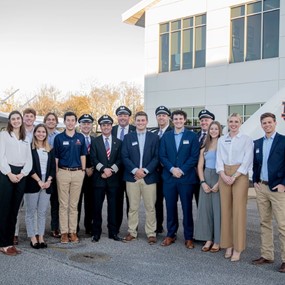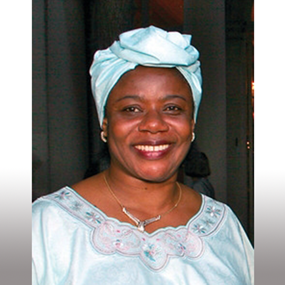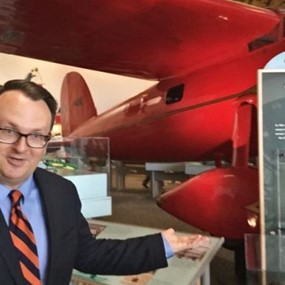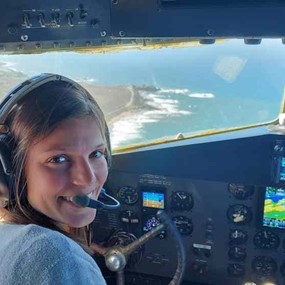Alumni Spotlight: Michael Gates, '08, CEO and founding partner of Gates Defense Systems
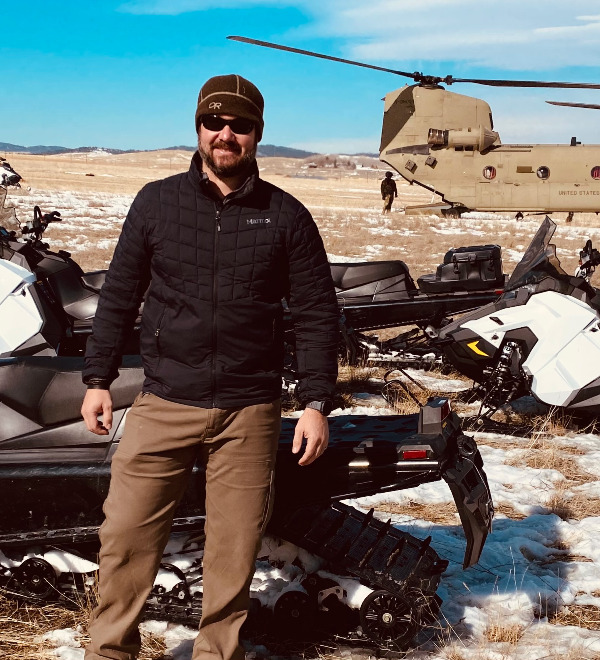
Michael Gates graduated from Auburn in 2008 with a degree in aviation management. After years working in the airline industry, he chose to pursue his long-time passion for national security. Gates is now the CEO and founding partner of Gates Defense Systems and founder of Resurgens Global. Student writer Elizabeth Phillips speaks with Gates about his passions and experiences since graduating.
What sparked your interest in the national defense industry?
So many things; from the first time I saw the Blue Angels fly in Pensacola to a very special time I spent with a few of the first Americans to arrive in Afghanistan after 9/11, these things certainly had an impact. Foremost though, would be my patriotism. I love our country dearly and want to ensure my work gives back to our nation’s security interests in a meaningful way. Everything we do is in the interest of preserving the lives of those who place themselves in harm’s way for our country. That is a huge weight and responsibility I take very seriously.
Also, there is a bit of a cool factor too, right? When you find yourself on a CH-47 helicopter with a special operations group loaded with snowmobiles, hurling through some rather steep terrain while watching them test your product, you can’t help but think “this is pretty cool.”
How were you able to transition from aviation management to national defense?
I get asked this a lot. People ask, “You weren't in the military? You weren't in the intelligence community? Then how on earth did you go from working at British Airways to doing this line of work?” I usually say, “let’s grab a beer sometime and I’ll explain.” But the short answer is supply chain, aviation management (my background), and national security are interwoven, and it is important that there are critical linkages drawn there. We saw the devastation that can happen on 9/11 when those things are viewed as disparate, along with a breakdown in government communication. I took the skill sets I developed while in the supply chain sector and begin to find ways to apply them in areas I knew would be a contribution, such as with business executives for national security and supporting some non—profit work in the Middle East. It really started there.
What inspired you to start your company? What were your goals starting out?
My overreaching goal was developing a company that was going to be meaningful in the national security conversation. There were several strategies involved in how I thought I would get there. I can honestly say none of those initial strategies panned out. The entrepreneurs out there will understand that!
Being in the information and technology sectors, and ensuring we are contributing to some real innovation across this industry was important. But I also wanted to create a business that had a culture which really encouraged people want to show up and give it their all. With GDS, you are not showing up to work for a brand, a leadership team, or a bottom line. You are showing up for a mission. You’re coming to work because you are leading the conversation in a sector starved for creativity. You’re showing up because a person down range or perhaps your colleague sitting next to you depends on the unique contribution you bring to the table.
After working with big organizations in the past, you learn the good, the bad, and the ugly of corporate atmosphere. At the end of the day, when you work for an organization that just excites the hell out of you and has a meaningful mission - one that makes you want to show up and give everything you have got - that's infectious. That infectiousness leads to good culture, innovation, and positive business results. That’s what we are building at GDS.
What role do you currently play in this business? What are your day-to-day responsibilities?
My role is CEO and founding partner. As a small business founder, I pretty much have my hands in each area of the business and operations. Thankfully, I've got an incredible team that supports various aspects of our business. I love the fact that we are small, and I can play a role in each of those.
In my day-to-day, I primarily focus on three aspects of the business. The first area is business development and driving new opportunities into the pipeline for us to turn over into sustainable revenue. The second is research and development, and the third is recruitment.
Research and development require us, as a tech company, to always be focused on what’s next. Whether that is identifying a threat to national security or understanding how to enhance our existing platforms, we are always looking for that edge. A lot of this work centers around partnerships, whether that be with a university, business, or government. These strategic partnerships, along with that culture I mentioned earlier, are the real engine of our R&D efforts.
When it comes to recruitment, I want to build a strong, diverse, and highly capable team. We have folks that join our company that are just excited as hell to show up and participate, whether they are showing up physically in an office, overseas on a project, or remotely contributing. I love reaching out to people and talking to them about opportunities to come and work with us.
Are there any objectives or accomplishments that you achieved through this organization that you’re especially proud of?
Having the opportunity to experience the mission impact with our clients, using our open source intelligence training or situational awareness capabilities, certainly is at the top of the list. When you get comments our frontline clients that explain the level of benefit they receive from our programs, it truly is a moment of utopia.
Also, being able to find a path back to Auburn University has been a sense of accomplishment. On a recent visit I was sitting the RBD Library sending some emails and waiting on a meeting with a university official, and I could not help but smile, thinking about the last decade or so since I left. We are working closely with the university to bring on interns who may be interested in our line of work, as well as developing some really cool programs that will certainly drive some significant innovation in our space.
You also started a nonprofit organization called Resurgens Global. Can you explain what this organization does and what motivated you to create it?
That's a real passion of mine. I spent some time on the Syrian border several years ago and witnessed families that were having to come across the border into Jordan and the impact it was having primarily on the children. I spent a lot of time in various schools and different camps near the border, witnessing these children interacting with each other and other adults. I was shocked with what I experienced.
As a father, I'm watching these kids and I'm thinking no child should ever have to go through the traumatic experiences that they've experienced. And you can see it in their eyes. Some of them, they're just lost, many were between the ages of three to ten. Most of them knew nothing other than the atrocities of war, from beheadings, barrel bombs, and human trafficking.
That's just a tragedy. These children are nonpolitical. They don't have a dog in the fight. They just want to be children. They want to pick up a crayon and color in a coloring book or kick a soccer ball or play on a Nintendo switch. Many of these children had no idea what to do with a coloring book and crayons when we provided it to them. This broke my heart.
So, my exposure to that initial experience was extremely moving. We take so many things for granted in this country and often forget the survival story of others who are in need outside of our borders.
I started Resurgens Global, which primarily focuses on helping NGOs who were operating in those environments, to provide geopolitical advisory, medical services, and educational supplies to communities who have been devastated by conflict. Currently we are partnered with a Los Angeles based facial reconstructive surgery foundation and Swisscoss in order to deliver some essential surgeries to victims of conflict in Northern Iraq. I could not be prouder playing a role in helping these women and children in need.
Why is it important to you to stay connected with Auburn University?
First of all, I truly love Auburn and love coming back. Secondly, I would consider Auburn a powerhouse when it comes to the talent it cultivates. It starts with the ethos of Auburn. It's believing in and loving hard work, right? It’s in the Auburn Creed. You have to love hard work in order to really excel in this space – and you just can't teach that, you either have it, or you don't. And so, I look for that work ethic – not just the hard work, but an ethos of supporting those that put it all on the line for our nation. So those are some key areas that I look at that are just things you can't teach that Auburn tends to have.
What do you look for in potential interns?
Specific attributes outside of a strong work ethic would be sincerity, enthusiasm, and energy. In that order. Those are attributes that need to be at one’s core to come work for us and these are things that you cannot teach or train. People who love working as a team on complex problems, then celebrating success after typically fit right in. Servant leadership is something that has to be cultivated and learned over time but is important to those who are in our network. It's difficult to talk to someone about servant leadership who’s just graduated. They're at Auburn and looking to get into the workforce and do great things – awesome. Learning servant leadership will teach them how to grow with the success that will ensue from the other characteristic I mentioned. So, you must be eager, want to get into the national security space, and enjoy hard work and complex environments.
Do you have any advice for students looking to enter the national defense industry?
Come in with an open mind and be confident with sharing your ideas on innovation, and always introduce creativity to the mix. Much of the defense sector is stagnant right now because innovation is not finding its way to the warfighter or to the government end-user who needs that information or needs that creativity to come forward. Be comfortable taking feedback! Don’t get offended because someone doesn't like your idea or your approach. Learn how to navigate that feedback, refine your approach, and keep pushing that creativity forward. And do it with the warfighter and their family in mind, and hoping they come home safe – always.

